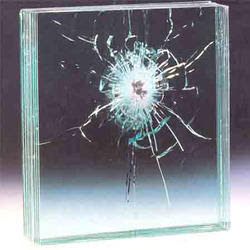The India Bullet-Resistant Glass Market Continues To Grow Owing To the Rising Demand from the Automotive and Defense Sectors and Imposition of Safety Protocols
Bullet-resistant
glass is a type of bullet-proof safety glass. These safety products are used in
industries ranging from aerospace and defense to law enforcement, but their
main application is bullet-resistant glass for ships, planes, and automobiles.
The term bulletproof glass is sometimes also used to describe window panes
found in windows, but this term is incorrect as they are not bulletproof. It is
important to note that while many of these products are indeed bulletproof,
they are not 100% bulletproof. However, when a product is bulletproof, it
almost always has additional other bullet-resistant features incorporated into
its design.
Bulletproof
glass refers to any item which is bulletproof but is also capable of resisting
impacts with a bullet or gunfire without suffering any damage. This includes
bullet-resistant fiberglass, bullet-resistant windows, bulletproof vests, and
bulletproof windowpanes. Bulletproof glass is actually a thin layer of
crystalline silicon sprayed or rolled into a thick sheet. The crystalline
structure of the material is designed to increase the rate of molecular transfer,
thereby increasing its hardness.
Increasing
demand for bullet-resistant glasses in the automotive industry is fueling the
growth of the India bullet-resistant glass market. The automotive industry of
India has gained rapid growth over the past few years owing to the rising
production of automobiles in the region. For instance, according to the Society
of Indian Automobile Manufacturers (SIAM), in 2020 around 2.9 million
commercial vehicles and passenger cars were sold in India. Moreover, the
growing financial infrastructure in India along with the increasing security
concerns is also boosting the demand in the India bullet-resistant glass
market.
This
increases the degree of shock resistance along with the thickness of the
material, meaning that ordinary attacks will not reduce the impact force on the
bulletproof glass. This is different than ordinary toughened glass, which is
not capable of increasing the hardness of an impact. In addition,
bullet-resistant glass does not shatter into blunt pieces when shot but will
shatter into oblong or even sharp pieces which will do less damage. This is
because ordinary firearms have steel balls that will bend and deform into sharp
points before piercing soft targets like the windows in a car. However, the
maximum bullet-resistant glasses that are made in India do not meet the
international regulatory standards. For instance, the EN 1063 of Europe creates
a negative brand image of the bulletproof glass that is developed in India and
is hindering the growth of the India bullet-resistant glass market. Moreover
increasing import of bulletproof glasses in India at a lower cost has also
negatively affected the growth of the India bullet-resistant glass market.




Comments
Post a Comment